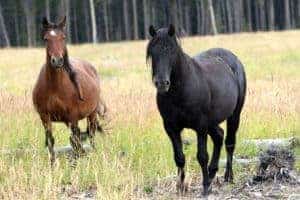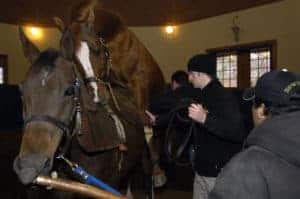
Stem Cell-PRP Combination Effective in Treating Lesions
A stem cell-PRP combination could be more effective than either therapy alone for treating soft tissue lesions


A stem cell-PRP combination could be more effective than either therapy alone for treating soft tissue lesions

Research indicates that one-sided imprint training is not might not be as beneficial as once thought.
A Dutch girl recovered after having supposedly acquired an antibiotic-resistant staph infection from her foal.

A logging company claims feral horses are damaging seedlings and acting aggressively toward workers.
Herds of Przewalski horses in the Chernobyl disaster area are dwindling, possibly due to human predation.
A stallion, several mares, and a foal have tested positive for equine viral arteritis at two French Lusitano
When it comes to the quality of cooled shipped semen for artificial insemination (AI), all semen collection centers are not equal. They’re far from it, in fact, according to a new study by Austrian researchers. The huge variation in the quality of the sperm processed by the collection center has an impact on the probability of the broodmare becoming pregnant.
Artificial insemination (AI) is today’s breeding standard for many types of horses. To find out how to make our readers’ artificial insemination programs more successful, The Horse went to two recognized experts in equine artificial insemination–both of them pioneers in their field.

Live cover breeding of horses remains a popular choice. Whatever your reason for choosing this method, these 10 tips will be useful as you plan a mating. Attention to safety and behavior go a long way in making the experience positive and successful.
The full skeleton of a horse that lived in France 100,000 years ago has been discovered in the volcanic region of Auvergne, according to several French news sources including the French Press Agency (AFP).
The use of non-steroidal anti-inflammatory drugs (NSAIDs) in international equestrian competition is definitively prohibited, following a unanimous vote by the members of the Federation Equestre Internationale (FEI), the governing body for international equestrian sports, during their General Assembly meeting Nov. 1-5 in Chinese Taipei.
According to a new study by European equitation scientists, horses might prefer to avoid rein tension rather than just get used to it. And beyond a certain force threshold, rein tension can cause conflict behavior. To make the most of training and to keep the horse’s mouth sensitive, riders need to know when to apply less rein tension, generally when the horse displays conflict behavior.

Often, the only clinical sign of endometritis is not what you do see but what you don’t see: a pregnancy. Endometritis is a major cause of female infertility, affecting up to 15% of broodmares. But because it frequently lacks clear clinical signs, it often goes undiagnosed.
After a squabble in the field, horses might “kiss and make up”–at least in their own equine way. But even more often, post-conflict horses are visited by a “peacemaker,” probably to preserve the unity of the group, according to a new study by European researchers. Long-term pasturemates sometimes show reconciliatory behavior after a moment of conflict, and a t
The trace element selenium appears to reinforce sperm quality and thus maintain a stallion’s fertility. When selenium is lacking, motility drops, sperm membranes break down, and the sperm’s acrosome (which covers the head) can deform.
Horses might experience increased stress during equestrian events and competitions, but that stress appears relatively mild and might even be beneficial according to new research by Austrian, German, and French equitation scientists.
Stay on top of the most recent Horse Health news with